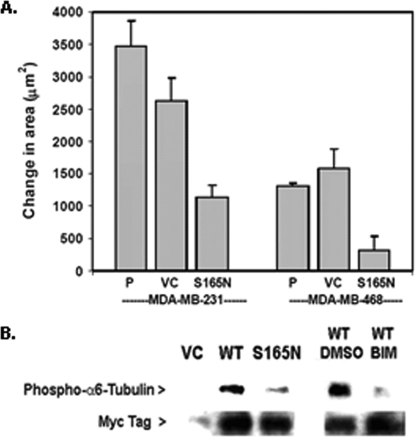FIGURE 4.
Phosphorylation-resistant α6-tubulin mutant (S165N) inhibits motility of human breast tumor cells. A, dominant-negative effect on motility following expression of GFP-(S165N)-α6-tubulin (4 μg of plasmid) in human breast tumor cell lines that express very high levels of PKCα (MDA-MB-231) or none at all (MDA-MB-468). Each value is the average of triplicate measurements ± S.D., and the results are representative of three independent experiments. P, parental cells. B, phosphorylation of Myc-tagged α6-tubulin reporter constructs in MDA-MB-468 cells. Cells were transfected for 48 h with 4 μg of plasmid encoding the Myc-tagged WT α6-tubulin, S165N mutant, or VC. Where indicated, cells were treated with either 1 μm BIM or DMSO (0.1%, v/v) and incubated at 37 °C for 30 min prior to cell lysis. Whole cell lysates were prepared in 0.2 ml of buffer containing 50 mm Tris-HCl, pH 7.4, 150 mm NaCl, 1 mm EGTA, 10 μm BIM, and 0.5% Nonidet P-40. After normalizing for total protein content (550 μg), lysates were diluted 5-fold in detergent-free buffer, followed by preclearing with mouse IgG-agarose and immunoprecipitation with 5 μg of mouse anti-Myc (6 h with rotation, 4 °C). Myc-tagged α6-tubulin (50 kDa band) was detected in a Western blot that was probed sequentially with rabbit anti-phospho-PKC substrates (1:500) and rabbit anti-Myc (1:1000). The results are representative of three independent experiments.

